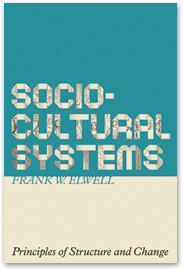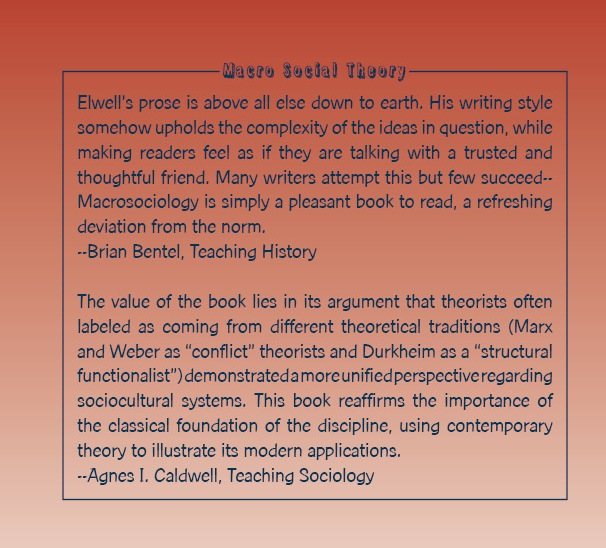
Sociocultural Systems: Principles of Structure and Change Macrosociology: Four Modern Theorists A Commentary on Malthus" 1798 Essay as Social Theory Great Classical Social Theorists In the Classical Tradition: Modern Social Theorists Dr. Elwell's Professional Page
|
rbert Spencer's Evolutionary Sociology T. Robert Malthus [1766-1834] | |
|
T. Robert Malthus on Evolution
By Frank W. Elwell
Malthus’s basic insight: Nature scatters its seeds in abundance, but it is
relatively sparse in the sustenance it provides. Therefore life must
continuously adapt in order to survive. Malthus is in obvious awe of the
evolutionary process--writing of the “powers of selection, combination, and
transmutation” of life.
"With the crude and puerile conceptions which we sometimes form of this
attribute of the Deity, we might imagine that God could call into being
myriads and myriads of existences, all free from pain and imperfection, all
eminent in goodness and wisdom, all capable of the highest enjoyments, and
unnumbered as the points throughout infinite space. But when from these vain
and extravagant dreams of fancy, we turn our eyes to the book of nature,
where alone we ca
Since nature has provided for an abundance of seed, but little sustenance,
human survival depends on exertion and thought. It is human intelligence,
Malthus believes, that is being selected by God’s grand design. According to
Malthus, material needs are at the base of human motivation. These needs
provide the stimulant for primitive man to devise new ways of exploiting her
environment. They are central in providing continual stimulation for the
development of the infant brain, and are probably always necessary to
stimulate people to productive activity. It is the effort to satisfy
physical needs for food and shelter that stimulate humans to greater effort
and innovation.
It is the press of population on carrying capacity that provides the impetus
for technological progress. There are eight major points regarding evolution
found in the 1798 Essay:
1.
population level is severely limited by subsistence
2.
when the means of subsistence increases, population increases
3.
population pressures stimulate increases in productivity
4.
increases in productivity stimulates further population growth
5.
since this productivity can never keep up with the potential of population
growth for long, there must be strong checks on
population to keep it in line with carrying capacity.
6.
it is through individual cost/benefit decisions regarding sex, work, and
children that population and production are expanded or contracted.
7.
positive checks will come into operation as population exceeds subsistence
level.
8.
The nature of these checks will have significant effect on the rest of the
sociocultural system--Malthus points to misery, vice, and poverty. For Malthus, the engine of social change (or social evolution) is in the relationships between population and production. Elements of the sociocultural system (social institutions, norms and values) must always adapt to this material base. Since societies must conform to natural law--that is the disparity in the powers of production and reproduction--no form of social organization or amount of technological innovation can escape these natural limits. It was Malthus who was responsible for the concept of the struggle for survival, or natural selection, upon which the theories of Darwin, and Wallace later depended. In his autobiography Darwin writes that
Similarly, Wallace reports in his autobiography that "perhaps the most
important book I read was Malthus'
Principle of Population...its main principles remained with me as a
permanent possession, and twenty years later gave me the long-sought clue of
the effective agent in the evolution of organic species" (1905).
Darwin’s principles were essentially an application of social science
concepts to the discipline of biology. As Darwin put it in the
Origin of Species,
"This is the doctrine of Malthus, applied to the whole animal and vegetable
kingdoms. As many more individuals of each species are born than can
possibly survive; and as, consequently, there is a frequently recurring
struggle for existence, it follows that any being, if it vary however
slightly in any manner profitable to itself, under the complex and sometimes
varying conditions of life, will have a better chance of surviving, and thus
be NATURALLY SELECTED. From the strong principle of inheritance, any
selected variety will tend to propagate its new and modified form” (1859,
2-3).
Where Malthus differs from Spencer and Wallace
(though not Darwin) is in their view of progress and the perfectibility of
man and society. Malthus’ essay was emphatically conceived as a refutation
of the enlightenment’s faith in progress. In Malthus’ view, no change in the
political, economic, or social system could eliminate poverty, famine, and
pestilence. While we could reform society and make a (somewhat) better
world, we cannot create a utopia. For a more extensive discussion of Malthus’s theories refer to Macro Social Theory by Frank W. Elwell. Also see Sociocultural Systems: Principles of Structure and Change to learn how his insights contribute to a more complete understanding of modern societies.
Bibliography
Darwin, Charles (1859). On the Origin of Species By Means of Natural
Selection, or, the Preservation of Favoured Races in the Struggle for Life
Public Domain Books. Kindle Edition.
Darwin, Charles (1881). The Autobiography of Charles Darwin (p. 42).
. Kindle Edition.
Elwell, F. (2009), Macrosociology: The Study of Sociocultural Systems.
Lewiston: Edwin Mellen Press.
Elwell, F. (2013), Sociocultural Systems: Principles of Structure and
Change. Alberta: Athabasca University Press.
Malthus, T. R. (Thomas Robert) (2012-05-12). An Essay on the Principle of
Population. Kindle Edition. Referencing this Site To reference T. Robert Malthus on Evolution you should use the following format: Elwell, Frank W., 2013, "T. Robert Malthus on Evolution," Retrieved August 31, 2013, [use actual date] http://www.faculty.rsu.edu/~felwell/Theorists/Essay/Malthus4.htm ©2013 Frank Elwell, Send comments to felwell at rsu.edu
|
 n read God as he is, we see a constant succession of
sentient beings, rising apparently from so many specks of matter, going
through a long and sometimes painful process in this world, but many of them
attaining, ere the termination of it, such high qualities and powers as seem
to indicate their fitness for some superior state. Ought we not then to
correct our crude and puerile ideas of infinite Power from the contemplation
of what we actually see existing? Can we judge of the Creator but from his
creation? And, unless we wish to exalt the power of God at the expense of
his goodness, ought we not to conclude that even to the great Creator,
almighty as he is, a certain process may be necessary, a certain time (or at
least what appears to us as time) may be requisite, in order to form beings
with those exalted qualities of mind which will fit them for his high
purposes?" (1798, 111).
n read God as he is, we see a constant succession of
sentient beings, rising apparently from so many specks of matter, going
through a long and sometimes painful process in this world, but many of them
attaining, ere the termination of it, such high qualities and powers as seem
to indicate their fitness for some superior state. Ought we not then to
correct our crude and puerile ideas of infinite Power from the contemplation
of what we actually see existing? Can we judge of the Creator but from his
creation? And, unless we wish to exalt the power of God at the expense of
his goodness, ought we not to conclude that even to the great Creator,
almighty as he is, a certain process may be necessary, a certain time (or at
least what appears to us as time) may be requisite, in order to form beings
with those exalted qualities of mind which will fit them for his high
purposes?" (1798, 111). In October 1838, that is, fifteen months after I had begun my systematic
enquiry, I happened to read for amusement 'Malthus on Population,' and being
well prepared to appreciate the struggle for existence which everywhere goes
on from long-continued observation of the habits of animals and plants, it
at once struck me that under these circumstances favourable variations would
tend to be preserved, and unfavourable ones to be destroyed. The result of
this would be the formation of new species. Here then I had at last got a
theory by which to work; but I was so anxious to avoid prejudice, that I
determined not for some time to write even the briefest sketch of it (1881,
42).
In October 1838, that is, fifteen months after I had begun my systematic
enquiry, I happened to read for amusement 'Malthus on Population,' and being
well prepared to appreciate the struggle for existence which everywhere goes
on from long-continued observation of the habits of animals and plants, it
at once struck me that under these circumstances favourable variations would
tend to be preserved, and unfavourable ones to be destroyed. The result of
this would be the formation of new species. Here then I had at last got a
theory by which to work; but I was so anxious to avoid prejudice, that I
determined not for some time to write even the briefest sketch of it (1881,
42).